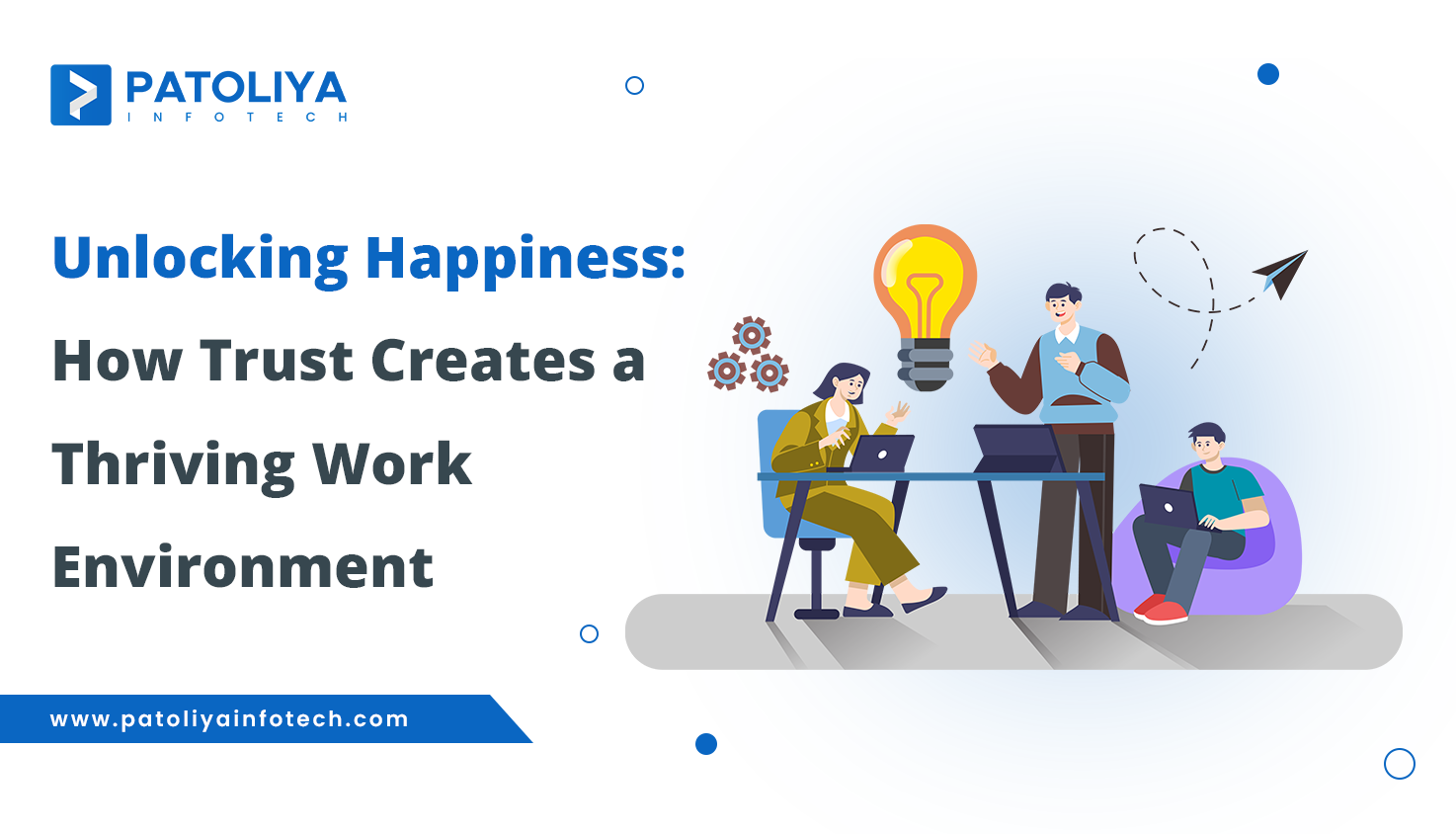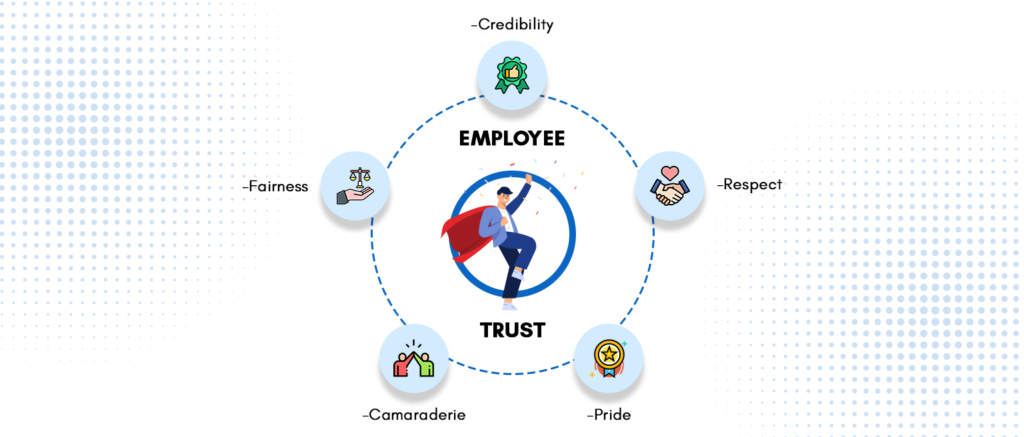Trust Based Techniques to Minimise Interference and Increase the Workflow

Creating a vibrant work atmosphere is more important than ever in the fast-paced, dynamic world of today's businesses.
The development of trust is one essential component that sticks out in building such an atmosphere.
A positive workplace culture is built on faith, which fosters innovation and collaboration and, eventually, opens the door to employee pleasure.
There are numerous theories on what defines an effective work environment.
It's easy to believe that happy employees are only those who receive excellent pay and benefits.
Perhaps they participate in profit-sharing programs through employee stock ownership plans, or perhaps they've embraced a more egalitarian "flat" organizational structure that excludes traditional hierarchies.
However, that assumption is wrong.
Trust in the Workplace: The Cornerstone of Employee Experience
The essence of the employee experience overcomes the divisions of private or public ownership, hourly or salaried roles, or a company's geographical location.
The key ingredient, in essence, is deceptively simple: trust. The crucial question arises: do your employees genuinely Count you?
Faith is an essential component of organizational dynamics, weaving together the threads of collaboration, communication, and a shared sense of purpose.
When faith is fostered, regardless of industry or setting, it becomes the driving force behind a healthy and cohesive workplace culture.
Fostering hope is thus more than simply a management tactic; it is the very fabric that characterizes a thriving and harmonious workplace.
How is trust established within a workplace?
Although the concept of trust may appear abstract, it is widely recognized as a critical asset for businesses.
However, encouraging employees to count on you is ineffective; a high-trust culture must be developed over time.
According to Great Place To Work research, three crucial components of such a culture are:
Credibility: Are leaders regarded as competent, communicative, and trustworthy?
Respect: Do employees feel respected as professionals as well as people with lives outside of work?
Fairness: Is the company seen as a place where everyone has an equal chance of success?
These elements are founded on a belief in diversity, equity, inclusion, and belonging. Faith fades quickly without a welcoming, inclusive, and equitable culture.
Know about Our culture is, what we believe in
The Foundations of Trust
By bridging the gap between words and deeds, great leaders create a culture of trustworthiness, respect, and fairness inside their organizations.

Authenticity
- Be direct and consistent in your communication.
- Make sure your activities in public reflect internal beliefs.
- Demand that remarks made in public accurately represent the experiences of employees.
- Encourage both sharing and listening in two-way conversations.
- Respond concretely to employee input.
Kindness
- Create an environment that values flexible scheduling, PTO use, and work-life balance.
- Show that you genuinely care about the personal lives of your colleagues.
- Recognize the accomplishments and efforts of your staff.
- Offer training and development initiatives, promoting completion.
- To enable everyone to contribute their complete selves to the workplace, emphasize inclusivity and a sense of belonging.
Equitability
- Review compensation to close any pay gaps for equal work.
- Increase board seats to amplify marginalized voices.
- Analyze workplace well-being programs to meet the needs of all employees.
Gaining faith is difficult and requires leadership from the top. In the modern workplace, isolated instances of trust within a team will not translate into overall success without a commitment from leadership.
Learn more about How to do the mind-body connection: how to prioritize your mental well-being
The Pillars of a Positive Workplace Culture

In any thriving work environment, certain elements serve as the foundation for a positive and productive culture. These essential pillars include:
Credibility:
Credibility is the cornerstone of trust within a team. Establishing and maintaining credibility involves transparency, consistency, and reliability. When team members trust one another and the leadership, it fosters a sense of security and confidence, creating a conducive atmosphere for collaboration and growth.
Respect:
Respect is the glue that holds a team together. In a respectful workplace, individuals value each other's opinions, diversity, and contributions. This creates an inclusive environment where everyone feels heard and appreciated, paving the way for innovation and mutual understanding.
Pride:
Taking pride in one's work and the organization is a powerful motivator. When individuals feel a sense of accomplishment and alignment with the company's values and goals, it not only boosts morale but also contributes to a positive work culture. Pride fosters dedication and a collective commitment to excellence.
Camaraderie:
Building a sense of camaraderie among team members goes beyond professional relationships; it involves cultivating a friendly and supportive atmosphere. When colleagues share a sense of belonging and friendship, it creates a collaborative spirit. This camaraderie helps in overcoming challenges, celebrating successes, and enhancing overall job satisfaction.
Fairness:
Fairness is crucial for maintaining a healthy workplace dynamic. Whether in decision-making processes, resource distribution, or opportunities for growth, fairness ensures that everyone is treated equitably. This builds trust and confidence, reducing conflicts and fostering a harmonious work environment.
By prioritizing these elements, organizations can lay the groundwork for a workplace culture that not only attracts talent but also retains and nurtures it, leading to sustained success and fulfillment for all team members.
Wrap Up
The journey toward unlocking happiness in the workplace is intricately linked to the establishment of trust. As explored in this discussion, trust serves as the catalyst for creating a thriving work environment. When trust is woven into the fabric of an organization, it becomes the cornerstone upon which positive workplace dynamics, collaboration, and individual well-being flourish.


